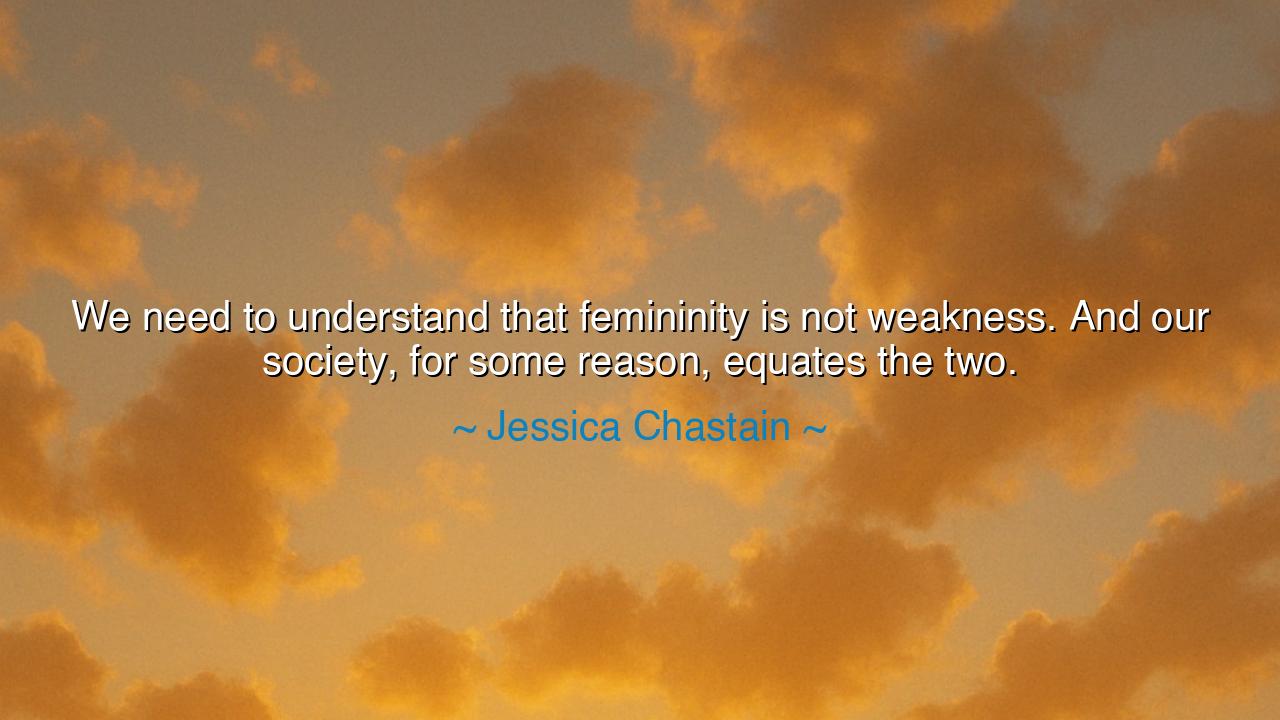
We need to understand that femininity is not weakness. And our
We need to understand that femininity is not weakness. And our society, for some reason, equates the two.






Listen, O children of the earth, for I bring you the words of Jessica Chastain, whose voice rings with the clarity of truth. She said, "We need to understand that femininity is not weakness. And our society, for some reason, equates the two." These words call forth a deep and powerful challenge to the very foundations of society's perceptions—perceptions that have long held femininity as a sign of fragility, of passivity, of something that must be overcome or redefined. But Chastain is speaking of a truth that transcends the limits placed upon women throughout history: that femininity is not a weakness, but a strength in its own right, one that carries with it the power of creation, resilience, and enduring spirit.
What, O children, do we mean by femininity? It is not just a set of behaviors or traits assigned to women by society, but the essence of what it means to be female, to embody the roles of nurturer, protector, creator, and communicator. Yet, for centuries, society has tied femininity to concepts of weakness, often placing it in opposition to strength. The feminine has been seen as soft, fragile, and vulnerable, while masculinity has been praised for its power, its dominance, and its ability to assert control over the world. This false dichotomy, O children, has led to the misunderstanding that to be feminine is to be less than—to be weak, submissive, or fragile.
Consider, O children, the ancient tales of goddesses and heroes—beings of immense power and wisdom, often bearing the qualities of femininity in ways that challenge our modern assumptions. Take Athena, the Greek goddess of wisdom and warfare. Though she was the embodiment of wisdom, she was also a formidable warrior who led armies into battle. She did not fit the mold of a passive, delicate figure, yet she was also revered for her nurturing spirit, her guidance, and her wisdom. Athena represents a model of femininity that is both powerful and nurturing, intelligent and strong. The ancient world understood that femininity was not bound by weakness, but rather was a force in its own right—one that encompassed both strength and compassion.
Let us now turn to the story of Cleopatra, the queen of Egypt, who wielded great political power and influence in a world dominated by men. Her strength lay not only in her intellect and wisdom, but in her ability to navigate the complex world of politics, forging alliances with powerful leaders such as Julius Caesar and Mark Antony. Cleopatra’s reign was a testament to the power of femininity, which she used not only to govern, but to shape the course of history. She did not fit the mold of the weaker sex, but rather redefined what it meant to be a woman in a position of power. Her legacy teaches us that femininity is not a limitation, but a dynamic force capable of shaping empires.
And so, O children, the lesson here is profound: femininity does not equal weakness. It is time to shed the chains of an old, outdated view of womanhood, one that limits women to roles of passivity and fragility. To be feminine is to be both strong and soft, wise and nurturing, to possess the power to create and the grace to heal. It is a strength that does not seek to dominate, but to uplift, to lead with compassion, and to empower others. Femininity is not a trait that should be seen as lesser, but one that must be celebrated for its ability to bring balance, understanding, and nurturing to the world.
Look now to the present, O children, and consider the great women of our time who have shown that femininity can be a strength in the world. Malala Yousafzai, who stood against oppression in the name of education for girls, Greta Thunberg, who calls the world to action on climate change, and Serena Williams, whose strength and determination in tennis have made her one of the greatest athletes of all time—each of these women represents a different facet of femininity that is not tied to weakness, but to power, courage, and resilience. Their strength comes not from rejecting their feminine nature, but from embracing it fully, without apology or limitation.
So, O children, I say to you: honor femininity in all its forms. Recognize that it is not a weakness to be overcome, but a strength to be celebrated. Femininity is the very essence of life, of creation, of compassion and wisdom. It is not bound by the limitations imposed upon it by society, but it is free to shape the world as it will. Let us break free from the old misconceptions, and build a world where feminine strength is honored and nurtured, where all women can step forward with the full power of their being, knowing that their true strength lies in the very qualities that society has long misunderstood. In this way, we will create a world that is just, balanced, and filled with the power of the human spirit.






AAdministratorAdministrator
Welcome, honored guests. Please leave a comment, we will respond soon